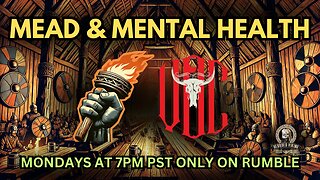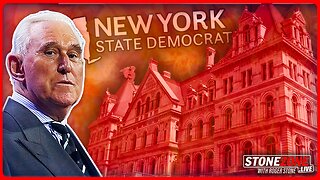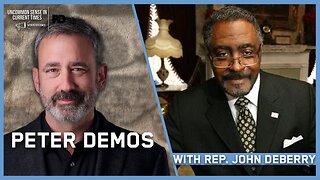Premium Only Content

Spinoza - Part 1
Baruch Spinoza b. Nov. 24, 1632 - d Feb 21, 1677 (44 yrs)
Introduction by John Wild (pages i to lix - 1 to 59)
John Wild quotes Spinoza in the Introduction: "The existence of God is an eternal truth."
John Wild claims: "Spinoza is primarily the philosopher of rationalism."
John Wild paraphrases Spinoza:
"The free man who achieves blessedness...has already transcended time. Immortality is not mere everlastingness but a state of being. The genius is no longer constrained within his finite organism. Through his reason, he has joined himself to the timeless order of the universe. He has freed himself from his earthly passions, and by attaching himself only to infinite objects, he has himself become infinite. By becoming one with God the free man is himself eternal."
John Wild claims: "Spinoza is primarily the philosopher of immanence."
John Wild summarizes Spinoza:
"The wise man cannot die. For he has freed himself from the love of external things. His life, like that of Socrates, has really been a long continuous death in which he has completely freed himself from the temporal body and its connections. So that there is nothing left for what we call death to consume. Instead of joining himself with the body and its lusts, the wise man through his reason unites himself only with eternal things. He does not love finite things, but loves them only in so far as they belong to God. Finally he becomes one with the object of his thought and love which cannot perish."
Section 1: ON THE IMPROVEMENT OF THE UNDERSTANDING
Covering Pages 1 - 7
"Riches, Fame and the Pleasures of Sense: with these three the mind is so absorbed that it has little power to reflect on any different good."
"Happiness or unhappiness is made wholly to depend on the quality of the object which we love."
"Love towards a thing eternal and infinite feeds the mind wholly with joy,...wherefore it is greatly to be desired and sought for with all our strength."
"The acquisition of wealth, sensual pleasure , or fame, is only a hindrance, so long as they are sought as ends not as means; if they be sought as means they will be under restraint, and, far from being hindrances, will further not a little the end for which they are sought..."
-
 50:28
50:28
Donald Trump Jr.
10 hours agoCutting Gov’t Waste, One Penny at a Time. Interview with Author Lee Smith | Triggered Ep. 215
154K98 -
 1:44:35
1:44:35
Flyover Conservatives
1 day agoThe Shocking Truth About Modern Medicine & The Ultimate Health Hack - Part 1 - Deep Dive: Drs. Mark and Michele Sherwood | FOC Show
34.9K2 -

I_Came_With_Fire_Podcast
8 hours ago"Mead & Mental Health" with ICWF Podcast & Vikings, Outlaws, & Cowboys Podcast
13.7K1 -
 1:32:15
1:32:15
Anthony Rogers
4 hours agoBeating Children (At Video Games)
19.2K1 -
 1:46:19
1:46:19
megimu32
6 hours agoON THE SUBJECT: SUPER BOWL FOLLOW UP!
58.3K9 -
 59:26
59:26
The StoneZONE with Roger Stone
5 hours agoWill New York Democrats Steal the U.S. House? | The StoneZONE
64.3K8 -
 1:14:02
1:14:02
We Like Shooting
18 hours ago $1.21 earnedDouble Tap 396 (Gun Podcast)
38.1K -
 56:54
56:54
PMG
10 hours ago $0.98 earnedReclaiming Our Voice: A Christian Perspective on Politics and Parenting With John DeBerry
34.8K2 -
 2:19:41
2:19:41
vivafrei
8 hours agoEp. 250: USAID Money-Laundering! DOGE Madness! Judicial CORRUPTION! & MORE! Viva & Barnes!
105K146 -
 2:15:09
2:15:09
The Quartering
10 hours agoMeltdown Over DOGE Gets Worse (Kanye Legendary Tantrum and More Woke Insanity)
66.9K20